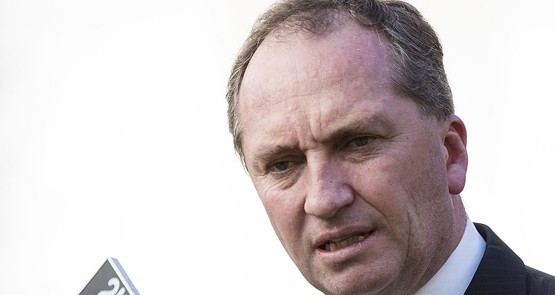
What will Barnaby say? Nine years ago, agricultural chemicals group Nufarm was the subject of a $3 billion takeover approach from a giant Chinese company, working with two US private equity sharks. That failed, leaving Sumitomo of Japan to snap up a blocking 23% stake in Nufarm that will control the fate of Australia’s leading maker of weedkillers, including the increasingly questioned glyphosate. The 2007 bid came from China National Chemical Corporation (ChemChina) which joined up with US private equity firms, Blackstone Group and Fox Paine Management III LLC, to make the offer at $12 a share. That was rebuffed and in 2009 Sumitomo of Japan bought 20% and increased it to 23%. Now Zhang Hua, chairman of Fuhua Group, one of China’s biggest glyphosate producers and a supplier to Nufarm, has grabbed a 5.16% stake in Nufarm using companies based in the tax haven of the British Virgin Isles. He said he and the companies had been buying Nufarm shares since November of last year. He told the ASX the transaction was “currently” intended as a financial transaction but reserved the right to increase or decrease the holding “from time to time”.
“The holders have no current intention to seek control of Nufarm (via a takeover or otherwise), to request a board seat, or to control or influence the composition of Nufarm’s board or the conduct of its affairs,” Zhang said. But that’s for the time being — perhaps only until July 2, or whenever the federal election is held. Deputy PM and Nationals leader Barnaby Joyce and the other Australian nativists on the right and left of politics (when it comes to Chinese investments, especially in farm land similar assets), have been very quiet on the fact that a Japanese company has controlled the major supplier of ag chemicals to farmers in this country. But if Zhang should try and build on his stake and make a bid for Nufarm, will Barnaby keep his peace? There are more and more reports of Chinese companies having too much debt and being unable to repay their banks. The head of the country’s central bank issued that same warning last weekend saying too much corporate debt was being raised, legally and illegally. Nufarm this morning reported a 12% lift in underlying interim profit to just over $71 million. An unchanged dividend of 4 cents a share was declared. That was incidental to the renewed takeover speculation in the company. — Glenn Dyer
Red flag alert. US researchers have raised a great big red flag over US earnings, which remain the core driver of share prices. According to research from Evercore ISI in New York, companies on the S&P 500, the most important market index around the world, are resorting to financial engineering and selective emphasis in their reports to make their earnings look better than they actually are. The firm said in a report that the spread between the sets of earnings reported by S&P 500 companies jumped to 30% in the fourth quarter from 13.1% in the final quarter of 2014. The level is more than double the median going back to 1995 of 12.2%. What this means is, companies are supposed to prepare their accounts and report their earnings in what is known as GAAP (or generally accepted accounting principles). But more and more companies (and the disease is just as rampant here in Australia) are adjusting their earnings to exclude certain items, such as non-recurring costs or write-downs, retrenchment costs and losses on asset sales. GAAP accounts do not allow for such departures.
The surge in losses and write downs in energy and other resource companies is a major factor behind this latest trend, but industrial and tech companies are joining the game. So we see the rise of profits reported in different ways, such as underlying earnings, adjusted earnings, earnings before interest, tax, depreciation and amortisation, earnings in constant currencies. Some of these measures have validity as a means of making apples for apples comparison, but when more and more analysts start spruiking these measures as “earnings” and not the GAAP figures, you know there’s a rort or two going on. This spread between adjusted earnings and GAAP earnings jumped in the lead up to the last two recessions, especially the GFC. — Glenn Dyer
Cash-heavy Wall Street. Meanwhile US research group FactSet says the S&P 500 companies holdings of cash and short-term investments totalled US$1.44 trillion in the fourth quarter, down a mere 0.5% from the end of 2014 and flat with the third quarter of 2015. But that cash figure was third highest amount in 10 years. FactSet says only two quarters in which the index had a higher cash balance were the final three months of 2014 and the third quarter of last year. And where did all that cash come from? Well, not unsurprisingly FactSet says the IT sector had the largest cash balance of US$580.2 billion at the end of 2015 (which has been the case for the past decade); its cash holdings jumped 15.1% in 2015. The energy sector endured the largest reduction, down 13.4% from the end of 2014 (also understandable given the slide in oil and gas prices). — Glenn Dyer







Wall Street holding large amounts of cash is what I understand to be one of the problems of lagging growth and investment around the world.
Although I’ve never been a Barnaby Joyce fan I have to concede that the guff from his opponents makes him look better with every passing day.